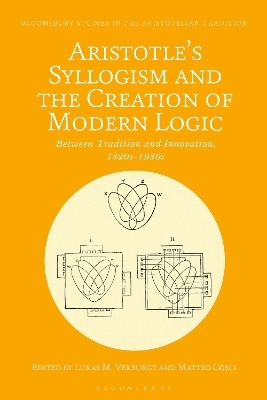
Aristotle's Syllogism and the Creation of Modern Logic
Bloomsbury Academic (Verlag)
978-1-350-22888-7 (ISBN)
For over two millennia, deductive logic was the syllogism and syllogism was the yardstick of sound human reasoning. During the 19th century, this hegemony fell apart and logicians, including Boole, Frege and Peirce, took deductive logic far beyond its Aristotelian borders. However, contrary to common wisdom, reflections on syllogism were also instrumental to the creation of new logical developments, such as first-order logic and early set theory. This volume presents the period under discussion as one of both tradition and innovation, both continuity and discontinuity. Modern logic broke away from the syllogistic tradition, but without Aristotle’s syllogism, modern logic would not have been born.
A vital follow up to The Aftermath of Syllogism, this book traces the longue durée history of syllogism from Richard Whately’s revival of formal logic in the 1820s through the work of David Hilbert and the Göttingen school up to the 1930s. Bringing together a group of major international experts, it sheds crucial new light on the emergence of modern logic and the roots of analytic philosophy in the 19th and early 20th centuries.
Lukas M. Verburgt is Gerda Henkel Stiftung Research Scholar and affiliated to the Netherlands Institute for Advanced Study in the Humanities and Social Sciences (NIAS), the Netherlands. Matteo Cosci is Research Fellow at the Department of Philosophy and Cultural Heritage of Ca' Foscari University Venice, Italy.
Introduction, Lukas M. Verburgt (NIAS/Leiden University, Netherlands) & Matteo Cosci (Università Ca’ Foscari, Italy)
1. Richard Whately’s Revitalization of Syllogistic Logic, Calvin Jongsma (Dordt University, USA)
2. Mill and the British Tradition of Inductive Logic: The Role of Syllogism, Lukas M. Verburgt (NIAS/Leiden University, Netherlands)
3. The Aristotelian Roots of Bolzano’s Logic, Mark Siebel (Carl von Ossietzky-Universität Oldenburg, Germany)
4. George Boole and the “Pure Analysis” of the Syllogism, David E. Dunning (Oxford University, UK)
5. Logic of Relations by De Morgan Peirce: A Case Study for the Refinement of Syllogism, Sun-Joo Shin (Yale University, USA)
6. Ernst Schröder’s Algebra of Logic and the “Logic of the Ancient”, Volker Peckhaus (Universität Paderborn, Germany)
7. Brentano and Hillebrand on Syllogism: Development and Reception of the “Idiogenetic” Theory, Matteo Cosci (Università Ca’ Foscari, Italy)
8. Hugh MacColl: Never Twist the Syllogism Again, J.M.C. Chevalier (Université Paris XII-Val de Marne, France)
9. Frege’s Relation to Aristotle and the Emergence of Modern Logic, Erich H. Reck (University of California, Riverside, USA)
10. Christine Ladd-Franklin’s Antilogism, Francine F. Abeles (Kean University, USA)
11. Syllogism and Beyond in the Peano School, Paola Cantù (Aix-Marseille Université, France)
12. Hilbert’s Use of the Syllogism, William Ewald (University of Pennsylvania, USA)
13. The Role of Syllogistic Logic in Early Set Theory, José Ferreirós (La Universidad de Sevilla, Spain)
14. The Fate of the Syllogism in the Göttingen School, 1910-1940, Curtis Franks (University of Notre Dame, USA)
Index
| Erscheinungsdatum | 06.08.2024 |
|---|---|
| Reihe/Serie | Bloomsbury Studies in the Aristotelian Tradition |
| Verlagsort | London |
| Sprache | englisch |
| Maße | 156 x 234 mm |
| Themenwelt | Geisteswissenschaften ► Philosophie ► Logik |
| Geisteswissenschaften ► Philosophie ► Philosophie Altertum / Antike | |
| Geisteswissenschaften ► Philosophie ► Philosophie der Neuzeit | |
| Mathematik / Informatik ► Mathematik ► Geschichte der Mathematik | |
| Mathematik / Informatik ► Mathematik ► Logik / Mengenlehre | |
| ISBN-10 | 1-350-22888-5 / 1350228885 |
| ISBN-13 | 978-1-350-22888-7 / 9781350228887 |
| Zustand | Neuware |
| Informationen gemäß Produktsicherheitsverordnung (GPSR) | |
| Haben Sie eine Frage zum Produkt? |
aus dem Bereich


